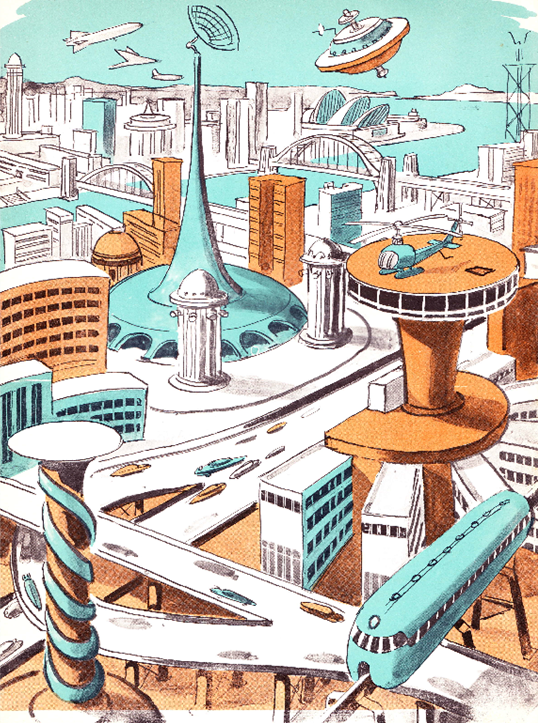
Every Composition has a beginning, a middle and an ending. The middle is by far the longest but the beginning and the ending are just as important.
If your Composition is about some kind of an outing it is not necessary to write half a page on rising early, having breakfast, preparing the lunch basket or backing the car out of the garage. The beginning should be brief and there is no reason why a Composition about an outing, for instance, should not begin at the actual scene of the beach, park, zoo, harbour or wherever it may be.
Similarly, the ending should finish the Composition quickly, clearly and fittingly. This not only rounds off your story, but it can often add that “finishing touch” which makes the difference between an ordinary Composition and a good one.
Surprise endings give an unexpected twist or turn to a story and this kind of finishing touch is often used in the imaginative kind of Composition. It is usually contained in no more than two or three sentences, which is no longer than the beginning paragraph, which sets the scene or sets the story in motion.
The middle of the Composition comprises the bulk of the story or description and may consist of three or four paragraphs. It should not contain anything which does not concern the particular story being told and should move on from one point to the next as each happens or is described.
In order to avoid mistakes and to use the best words and phrases, each sentence should be carefully thought out before putting pen to paper. Try to avoid writing the first thing that enters your mind but do not wait too long for ideas. Once you have begun keep straight on until the story is ended. Do not make false starts by crossing out or ruling off and starting all over again.
When you have finished a Composition, read it right through and see how it sounds to you. Correct any mistakes in grammar or punctuation. Do not be afraid to use any big or unfamiliar word simply because you cannot spell it. Use your Dictionary.
Rewrite your Composition, after you have finished it, wherever you can say something in a better way. Cut out parts that are not necessary to your story or description.
It is only writing many Compositions that is going to make you good at it. Reading and listening to stories and noticing the good words and phrases in them and borrowing them and using some of the good ideas will improve your ability to write Compositions.
Remember your paragraphs. Several sentences make a paragraph and several paragraphs make a Composition. Just as a sentence tells you a definite amount and no more, so also does a paragraph. Whenever a new part of the story or description is reached, begin a new paragraph.
PAST, PRESENT OR FUTURE
Here is a paragraph written about the past:
Last year I attended school every day. I was so regular in my attendance that I received a certificate for it. Not only was I regular but I was always punctual, never being late once. I took some pride in this achievement of mine.
Here is a paragraph about the present:
I like to reach school well before the bell rings to go into class. I can play with my mates in the playground and have a good yarn with them before lessons begin. At the moment we are practising with our yo-yos and talking about the football and cricket for this year.
Here is a paragraph about the future:
In the coming football season I shall try to qualify for the school team. When the try-outs are held I shall be so well trained that I shall stand a good chance of sel
ection. I shall begin training even before the cricket season ends. The cricket will not be finished before April or May.
If you put these three paragraphs together you have a Composition written about the past, the present and the future. Any one Composition may have all these periods of time in them. On the other hand, you may write a Composition which is all in the past, all in the present, or all in the future.
Even in the one paragraph you may have sentences about different times, past, present or future. But never have more than one time in any one sentence.
WRITING ABOUT THE FUTURE
Remember, things have not happened, nor are they happening; they will or may happen, will be happening or occurring, and so on.
What the World Will Be Like in a Hundred Years.
Paragraphs:
- More of everything—people, houses, shops, motor cars, factories, farms, dams, power plants, and so on.
- Differences in fashion—dress, clothing, hair styles, motor car design, building structures —wider roads—overhead pedestrian crossings and footpaths at level of first floor of high buildings in cities, etc.
- New towns and industries in country—new irrigation schemes based on new dams and canals—new hydro-electric schemes—more people in country and closer farming settlement.
- Development and advancement of [poorer] countries [and] … increasing trade and travel between the countries.
- Things which might lead to war and disputes—things which could lead to peace and agreement—com munications and talks, meetings and games—rich countries and poor —education, medicine, religions and beliefs.
Here are some other subjects on which you can write:
- What I Plan For My Next Vacation.
- What Dad Will Do If He Wins the Lottery.
- What Mum Will Do When We Have a Party.
- What We Would Do If War Came.
Lake, W.G. c.1965. Planned Composition, Book 3. Sydney: Aidmasta Productions, pp.3, 13, 18.
